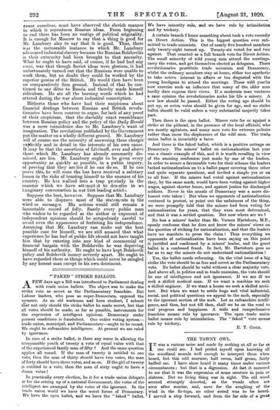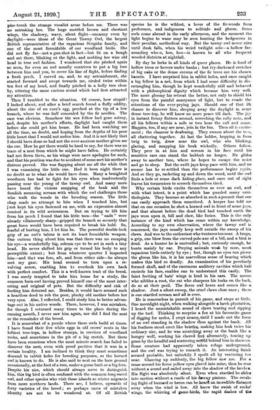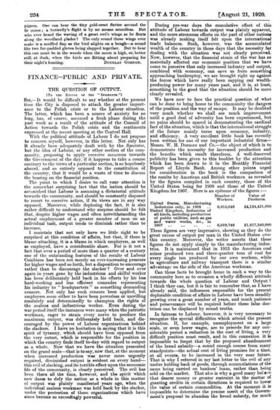1.1:1E TAWNY OWL.
TT was a curious noise and made by nothing at all as far M one could see. I had prided myself upon knowing all the woodland sounds well enough to interpret them when heard, but this odd murmur, half croon, half groan, fairly baffled me. I have since heard it many times under various circumstances ; but that is a digression. At last it occurred to me that it was the expression of some creature in pain or distress. But no living thing was in sight. The old wood seemed strangely deserted, as the woods often are soon after sunrise, and, save for the soughing of the wind in the fir-tops, no other sound was to be heard. I moved a step forward, and from the far side of a great.
pine-trunk the strange vocalist arose before me. There was no mistaking her. The huge mottled brown and chestnut wings, the shadowy, wavy, silent flight—uncanny even by daylight—were those of the Great Tawny Owl, the largest British representative of the rapacious Strigidas family, and one of the most formidable of our woodland birds. She did not fly far—not a gun-shot in fact—but lit on a bough and sat there, blinking at the light, and nodding her wise old head in true owl fashion. I wondered that she pitched again so soon, for even an owl usually contrives to put a big tree between him and you, to cover his lino of flight, before finding a fresh perch. I moved on, and, to my astonishment, she started forward and swept towards me, circled twice within ten feet of my head, and finally pitched in a holly tree close by, uttering the same curious sound which had first attracted my attention.
Then I tumbled to the situation. Of course, how stupid ! I looked about, and atter a brief search found a fluffy oddity,
about the size of an emu's egg, perched at the tip of a low
branch, where he was- half concealed by the fir needles. The case was obvious. Somehow the wee fellow had gone astray,
and, despite his mother's efforts, daylight had caught them before she could get him home. He had been watching me all the time, no doubt, and hoping from the depths of his poor little heart that I would not notice him. And it is not likely that I should have done so had not the over-anxious mother given me the cue. How he got there would be hard to say, for there was no trace of a nest from which he might have fallen. He certainly had not flown there, as his wings were mere apologies for such, and that his position was duo to accident of some sort his mother's distress proved. She was flapping about me all the while that I was examining the little one. Had it been night there is no doubt as to what she would have done. Many a benighted woodman has had to fight for his eyes when inadvertently passing near the young of the tawny owl. And many more have heard the vicious snapping of the beak and the fiendish menacing scream with which the owl challenges those who walk the woods in the breeding season. The little chap made no attempt to bite when I touched him, but j ust kept his eyes fastened on me, with an expression almost comical in its wild seriousness. But on trying to lift him from his perch I found that his little toes—the " nails " were already villainously sharp—gripped the branch so securely that great force would have been required to break his hold. So, fearful of hurting him, I let him be. The powerful double-lock grip of an owl's talons is not its least formidable weapon.
One curious thing about him was that there was no escaping his eye—a wonderfully big, solemn eye to be set in such a tiny head. He never shifted his grip or turned his body to any perceptible extent ; but from whatever quarter I inspected him—and that was fore, aft, and from either side—he always met my gaze. His head seemed to turn upon a re- volving screw, enabling him to overlook his own back with perfect comfort. This is a well-known trait of the breed.
I was sorely tempted to take him home for a study, the common barn-owl having proved himself one of the most inter- esting and original of pets. But the difficulty and risk of feeding him deterred me. Besides, it would have seemed such a heartless deed to rob the poor, plucky old mother before her very eyes. Also, I reflected, I could study him to better advan- tage out in his native woods. There, however, I was mistaken, for though I returned many times to the place during the ensuing month, I never saw him again, nor did I find the neat or the remainder of the brood.
It is somewhat of a puzzle where these owls build at times. I have found their five white eggs in old crows' nests in the loftiest tree-tops, in hollow stumps, in crevices of woodland rocks, and sometimes in the pit of a big crotch. But there have been occasions when the most minute search has failed to discover the nest, even with proof positive that it was in a certain locality. I am inclined to think they must sometimes descend to rabbit holes for breeding purposes, as the horned owl is known to do. He is also said to nest on the bare ground occasionally, at the foot of a tree, under a gorse bush or a big fern.
Despite his size, which should always serve to distinguish him, this big bird is often confused with the common long-eared owl, and other species who visit these islands as winter migrants from more northern lands. There are, I believe, upwards of forty varieties of the breed ; so perhaps cases of mistaken identity are not to be wondered at. Of all British species he is the wildest, a lover of the fir-woods from preference, and indigenous to solitude and gloom. Some owls come abroad in the early afternoon, and the moment the light begins to wane may be seen hunting the hedgerows in their peculiar, methodical way. But the tawny owl never stirs until dusk falls, when his weird twilight solo—a hollow far- sounding who-o, hoo, hoo—is known to all who frequent wooded districts at nightfall.
By day he lurks in all kinds of queer places. He is fond of hollow trees or hovers under banks ; but ivy-darkened crotches of big oaks or the dense crowns of the fir trees are his chosen haunts. I have surprised him in rabbit holes, and once caught a big fellow in a net, from which I had some difficulty in dis- entangling him, though he kept wonderfully still and behaved with a philosophical dignity which became him very well.
The more gloomy his retreat the better, not only to shield his eyes from the painful annoyance of light, but to evade the attentions of the ever-prying jays. Should one of that ilk chance to discover him, sleeping away the daylight in some dense tree-top, he will know no more peace till dark. The jay in instant frenzy flutters around, screeching the rally note, and all his fellows within a mile or two hear the call and come. Magpies, too, if any are near, join in the fun. Then all is excite- ment ; the clamour is deafening. They swarm about the tree, all chattering together. At last the bolder, hopping in from twig to twig, draw near the owl, who sits blinking, glaring, and snapping his beak wickedly. Others follow. They peer in at him and scream in his face until his sensitive ears can stand the hubbub no longer. He glides away to another tree, where he hopes to escape the noise and go to sleep. But the swift jays keep pace with him, and no sooner has he re-settled than the performance begins again. And so they go, racketing up and down the wood, until the owl finds a hole or some dark hiding-place, and once out of sight leaves his tormentors to screech themselves tired.
Why certain birds excite themselves so over an owl, and with what intent, is a point which has puzzled many orni- thologists. They become so absorbed in such a pursuit that one can easily approach them unnoticed. A keeper has told me that on one occasion he shot a horned owl in front of some jays, and that almost before the dead bird had touched earth the jays were upon it, bill and claw, like furies. This is the only instance of the kind which has come within my knowledge.
According to my own observation, where the tawny owl is concerned, the jays usually keep well outside the sweep of his claws. And woe to the enthusiast who 'ventures too near. A lunge, a grip, one blow from the curved pole-axe of a bill, and a bird is dead. As a hunter he is unrivalled ; but, curiously enough, he hunts mainly by ear. Preying animals woDk by nose, most rapacious birds entirely by eye ; but, though no eyes can pierce the gloom like his, it is his marvellous sense of hearing which makes this bird so deadly. An examination of his peculiarly formed skull, and of the enormous auditory cavities which half encircle his face, enables one to understand this easily. The faint fretting of bats' wings is loud in his ears. The mouse who nibbles a root, the rat who sharpens his tusks on the bark, do so at their peril. The fierce owl hears and comes like a shadow. Just a silent swoop, the cruel claws close once ; there is one startled scream and all is over.
He is remorseless in pursuit of his game, and stops at little. One moonlight night, when walking alongside a larch plantation,
I heard the unmistakable sound of claws tearing and ripping up the turf. Thinking to surprise a fox at his favourite game of digging for moles, I crept nearer, until I made out the form
of an owl standing in the shadow dies() against the bank. All his feathers stood erect like bristles, making him look twice his ordinary size, and ho was scrateliins away at the bank like a hungry wolf, working his clawed feet alternately, tearing up grass by the handful and scattering mo:tild behind him in showers.
Some creature had apparently taken refuge underground, and the owl was trying to unearth it. An interesting finish seemed probable, but unluckily I spoilt all by venturing tco
near. Glancing up suddenly, the big fellow saw me. Vor a tense second his fierce yellow eyes glared into mine, then he rose
without a sound and sailed away into the shadow of the larches.
His flight was absolutely silent. 4ven when startled he slides into motion without a rustle of his downy pinions. The creak- ing flight of buzzard or heron can be heard an incredible distance away when the wind is low. All know the swish of rooks' wings, the whirring of game-birds, the rapid dashes of the
pigeon. One can hear the finy gold-crest flutter around the Sr cones ; a butterfly's flight is by no means soundless. But who ever heard the waving of a great owl's wings as he floats along the woodland glades 1 The ,only sound those wings ever make is a muffled flap as the bird alights on a bough—a sound like two fur-padded gloves being clapped together. But to hear this one must be in the woods when the moon is high, or, better still, at dusk, when the birds are flitting about preparing for




































 Previous page
Previous page